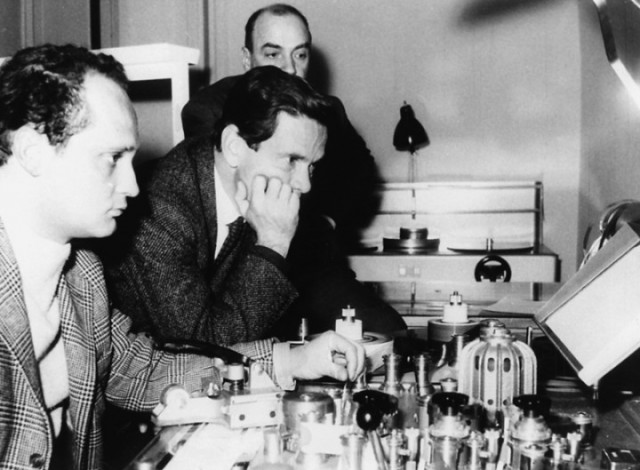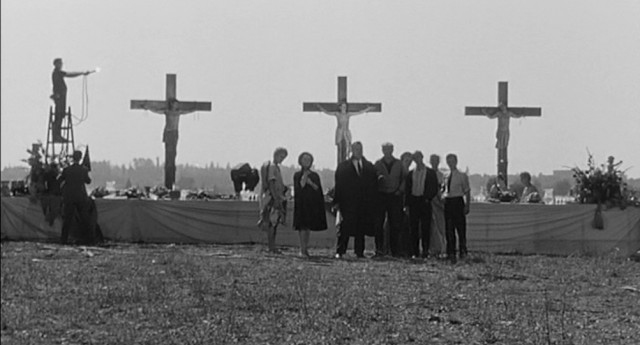
Nino Baragli, Pier Paolo Pasolini, and Gastone Ferranti edit the controversial sociopolitical documentary LA RABBIA
LA RABBIA DI PASOLINI (THE ANGER OF PASOLINI) (Pier Paolo Pasolini, 1963)
MoMA Film, Museum of Modern Art
11 West 53rd St. between Fifth & Sixth Aves.
Wednesday, December 26, 4:30
Series runs through January 5
Tickets: $12, in person only, may be applied to museum admission within thirty days, same-day screenings free with museum admission, available at Film and Media Desk beginning at 9:30 am
212-708-9400
www.moma.org
 In 1963, producer Gastone Ferranti asked Italian director Pier Paolo Pasolini to make a leftist political documentary about the postwar situation utilizing the producer’s large collection of Mondo Libero newsreel footage, answering the question “Why is our life dominated by discontent, by anguish, by the fear of war, by war?” Not thrilled with the result, he chopped Pasolini’s film in half and hired right-wing demagogue Giovanni Guareschi to create a conservative documentary providing an opposing viewpoint. La rabbia, or The Anger, opened in theaters in Italy and was quickly pulled from release, essentially disappearing until 2005, when a complete color negative was discovered and the two parts were restored and brought back together in a deluxe DVD package. La rabbia di Pasolini (The Anger of Pasolini), which is screening with the amazing La ricotta on December 26 at 4:30 as part of MoMA’s Pasolini career retrospective, is a curious examination of the state of the world. “My idea was to offer a Marxist denunciation of the society and events of the time,” Pasolini explained. Over the course of fifty-four minutes, he and editor Nino Baragli (with Giuseppe Bertolucci handling the recent reconstruction) create a cinematic collage of religion, communism, fascism, socialism, poverty, hunger, colonialism, race, and war through footage of the Hungary revolts of 1956, protests in Rome and Madrid, the war in Algeria, the coronation of Queen Elizabeth II, the rise of Patrice Lumumba in the Belgian Congo, and clips of such other international figures as Lenin, Stalin, Pope John XXIII, Sukarno, Nasser, de Gaulle, Eisenhower, Khrushchev, Yuri Gagarin, and even Marilyn Monroe as he poetically laments about life in the twentieth century. “People of color, it is in hope that man has no color,” one of his narrators says in the film. (The text is recited by actor Giorgio Bassani and painter Renato Guttuso; works by the latter are included in the documentary, along with pieces by Ben Shahn, Jean Fautrier, and George Grosz.) “Long live freedom,” the film repeats, but there’s not much promise for the future.
In 1963, producer Gastone Ferranti asked Italian director Pier Paolo Pasolini to make a leftist political documentary about the postwar situation utilizing the producer’s large collection of Mondo Libero newsreel footage, answering the question “Why is our life dominated by discontent, by anguish, by the fear of war, by war?” Not thrilled with the result, he chopped Pasolini’s film in half and hired right-wing demagogue Giovanni Guareschi to create a conservative documentary providing an opposing viewpoint. La rabbia, or The Anger, opened in theaters in Italy and was quickly pulled from release, essentially disappearing until 2005, when a complete color negative was discovered and the two parts were restored and brought back together in a deluxe DVD package. La rabbia di Pasolini (The Anger of Pasolini), which is screening with the amazing La ricotta on December 26 at 4:30 as part of MoMA’s Pasolini career retrospective, is a curious examination of the state of the world. “My idea was to offer a Marxist denunciation of the society and events of the time,” Pasolini explained. Over the course of fifty-four minutes, he and editor Nino Baragli (with Giuseppe Bertolucci handling the recent reconstruction) create a cinematic collage of religion, communism, fascism, socialism, poverty, hunger, colonialism, race, and war through footage of the Hungary revolts of 1956, protests in Rome and Madrid, the war in Algeria, the coronation of Queen Elizabeth II, the rise of Patrice Lumumba in the Belgian Congo, and clips of such other international figures as Lenin, Stalin, Pope John XXIII, Sukarno, Nasser, de Gaulle, Eisenhower, Khrushchev, Yuri Gagarin, and even Marilyn Monroe as he poetically laments about life in the twentieth century. “People of color, it is in hope that man has no color,” one of his narrators says in the film. (The text is recited by actor Giorgio Bassani and painter Renato Guttuso; works by the latter are included in the documentary, along with pieces by Ben Shahn, Jean Fautrier, and George Grosz.) “Long live freedom,” the film repeats, but there’s not much promise for the future.

Pasolini examines the Passion of the Christ and social and religious conditions in Italy in riotous satire LA RICOTTA
LA RICOTTA (Pier Paolo Pasolini, 1962-63)
MoMA Film, Museum of Modern Art
11 West 53rd St. between Fifth & Sixth Aves.
Wednesday, December 26, 4:30
Series runs through January 5
Tickets: $12, in person only, may be applied to museum admission within thirty days, same-day screenings free with museum admission, available at Film and Media Desk beginning at 9:30 am
212-708-9400
www.moma.org
 In 1962, producer Alfredo Bini invited Pier Paolo Pasolini to participate in an omnibus film featuring four shorts, which came to be known as Ro.Go.Pa.G. for the four directors involved, Roberto Rossellini (llibatezza), Jean-Luc Godard (Il Nuovo Mondo), Pasolini, and Ugo Gregoretti (Il Pollo Ruspante). Pasolini contributed the mini-masterpiece La ricotta, a marvelously entertaining satire set around the making of a film about the Passion of the Christ. Mario Cipriani stars as Givoanni Stracci (“Joe Rags”), a goofy, very hungry man who is playing the role of the good thief in the film within a film. As the put-upon Stracci desperately tries to feed his family and get a bite to eat for himself, the director, played by Orson Welles (dubbed by La rabbia narrator Gregorio Bassani), has to deal with a pampered lead actress (Laura Betti), a crew that keeps playing hip 1960s cha-cha music instead of the intended classical score by Scarlatti (Carlo Rustichelli’s soundtrack is mind-blowingly magnificent), and a nosy reporter (Vittorio La Paglia) who wants an interview — which turns into a riotous segment with Welles quoting from Pasolini’s Mamma Roma book. “What do you think of Italian society?” the reporter asks. “The most illiterate masses and the most ignorant bourgeoisie in Europe,” the director replies. Pasolini fills La ricotta with inside jokes, social commentary, and wry humor while he and cinematographer Tonino Delli Colli go from Technicolor biblical epic to black-and-white neo-Realist melodrama to speeded-up Hollywood slapstick comedy. In the film’s introduction, Pasolini says, “I want to state here and now that however La ricotta is taken, the story of the passion, which La ricotta indirectly recalls, is for me the greatest event that has ever happened.” That didn’t stop the government from arresting Pasolini upon the film’s release, charging him with “insulting the religion of the state,” and sentencing him to four months in prison, a verdict that was later overturned on appeal. A small classic that has to be seen to be believed, La ricotta is screening on December 26 as part of a double feature with La rabbia di Pasolini as MoMA’s tribute to the Italian genius continues.
In 1962, producer Alfredo Bini invited Pier Paolo Pasolini to participate in an omnibus film featuring four shorts, which came to be known as Ro.Go.Pa.G. for the four directors involved, Roberto Rossellini (llibatezza), Jean-Luc Godard (Il Nuovo Mondo), Pasolini, and Ugo Gregoretti (Il Pollo Ruspante). Pasolini contributed the mini-masterpiece La ricotta, a marvelously entertaining satire set around the making of a film about the Passion of the Christ. Mario Cipriani stars as Givoanni Stracci (“Joe Rags”), a goofy, very hungry man who is playing the role of the good thief in the film within a film. As the put-upon Stracci desperately tries to feed his family and get a bite to eat for himself, the director, played by Orson Welles (dubbed by La rabbia narrator Gregorio Bassani), has to deal with a pampered lead actress (Laura Betti), a crew that keeps playing hip 1960s cha-cha music instead of the intended classical score by Scarlatti (Carlo Rustichelli’s soundtrack is mind-blowingly magnificent), and a nosy reporter (Vittorio La Paglia) who wants an interview — which turns into a riotous segment with Welles quoting from Pasolini’s Mamma Roma book. “What do you think of Italian society?” the reporter asks. “The most illiterate masses and the most ignorant bourgeoisie in Europe,” the director replies. Pasolini fills La ricotta with inside jokes, social commentary, and wry humor while he and cinematographer Tonino Delli Colli go from Technicolor biblical epic to black-and-white neo-Realist melodrama to speeded-up Hollywood slapstick comedy. In the film’s introduction, Pasolini says, “I want to state here and now that however La ricotta is taken, the story of the passion, which La ricotta indirectly recalls, is for me the greatest event that has ever happened.” That didn’t stop the government from arresting Pasolini upon the film’s release, charging him with “insulting the religion of the state,” and sentencing him to four months in prison, a verdict that was later overturned on appeal. A small classic that has to be seen to be believed, La ricotta is screening on December 26 as part of a double feature with La rabbia di Pasolini as MoMA’s tribute to the Italian genius continues.